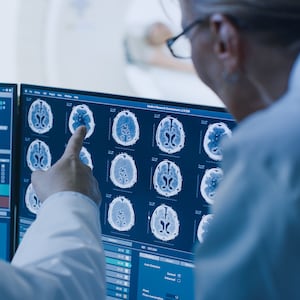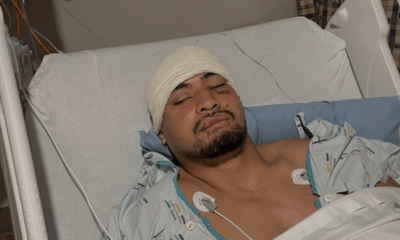Health
New Medication Promises to Transform Brain Injury Recovery

Neurologists are investigating new medications that could significantly aid recovery after a stroke or traumatic brain injury. Recent advancements in neuroscience suggest that targeted therapies may offer hope for patients like Debra McVean, who experienced a stroke in March 2024. Upon waking in the hospital, McVean found herself unable to move her left arm or leg, leaving her paralyzed on one side.
A blood clot had blocked an artery in her neck, leading to a critical lack of oxygen for her brain cells. An MRI revealed a concerning dark spot in her brain, indicating the extent of the damage. While her doctor informed her family about the situation, he could not provide a clear prognosis. “Something’s missing there, but you don’t know what,” recalled Ian McVean, Debra’s husband. “And you don’t know how that will affect her recovery. It’s that uncertainty; it eats away at you.”
Challenges in Brain Injury Recovery
Unlike a broken bone, recovering from a brain injury presents unique challenges. There is often no straightforward path to healing, and medical professionals currently lack effective tools or therapies to guide the recovery process. Standard practice involves encouraging patients to engage in rehabilitation while hoping for the best outcomes.
Neurologists are now exploring innovative medications aimed at enhancing brain recovery. These therapies focus on repairing damaged brain cells and promoting neuroplasticity, the brain’s ability to reorganize itself by forming new connections. Preliminary studies suggest that such treatments could lead to improved recovery rates and better quality of life for stroke survivors.
Research indicates that a substantial portion of stroke patients, approximately 795,000 annually in the United States alone, experience significant challenges during their recovery process. Current rehabilitation methods include physical therapy, occupational therapy, and speech therapy, but the effectiveness varies greatly among individuals. With no guaranteed recovery timeline, the emotional toll on patients and their families can be considerable.
The Future of Neuroscience
As scientists delve deeper into the mechanisms of brain injury and recovery, the potential for revolutionary treatments becomes increasingly tangible. The development of a medication that aids brain healing could fundamentally alter the landscape of neurology and patient care.
In addition to improving physical recovery, these innovations may also address the cognitive and emotional repercussions of brain injuries, which often accompany physical impairments. This holistic approach could foster a more comprehensive recovery strategy that prioritizes overall brain health.
While the journey toward finding effective treatments continues, the experiences of patients like Debra McVean highlight the urgent need for advancements in this field. As research progresses, the hope is to replace uncertainty with a clear path toward recovery, providing patients and their families with the support they desperately need.
-

 World4 months ago
World4 months agoTest Your Knowledge: Take the Herald’s Afternoon Quiz Today
-

 Sports5 months ago
Sports5 months agoPM Faces Backlash from Fans During Netball Trophy Ceremony
-

 Lifestyle5 months ago
Lifestyle5 months agoDunedin Designers Win Top Award at Hokonui Fashion Event
-

 Entertainment5 months ago
Entertainment5 months agoExperience the Excitement of ‘Chief of War’ in Oʻahu
-

 Sports5 months ago
Sports5 months agoLiam Lawson Launches New Era for Racing Bulls with Strong Start
-

 Top Stories2 weeks ago
Top Stories2 weeks agoTongan Star Eli Katoa Shares Recovery Update After Surgery
-

 World5 months ago
World5 months agoCoalition Forms to Preserve Māori Wards in Hawke’s Bay
-

 Health5 months ago
Health5 months agoWalking Faster Offers Major Health Benefits for Older Adults
-

 Lifestyle5 months ago
Lifestyle5 months agoDisney Fan Reveals Dress Code Tips for Park Visitors
-

 Politics5 months ago
Politics5 months agoScots Rally with Humor and Music to Protest Trump’s Visit
-

 Top Stories5 months ago
Top Stories5 months agoUK and India Finalize Trade Deal to Boost Economic Ties
-

 Health2 months ago
Health2 months agoRadio Host Jay-Jay Feeney’s Partner Secures Visa to Stay in NZ









